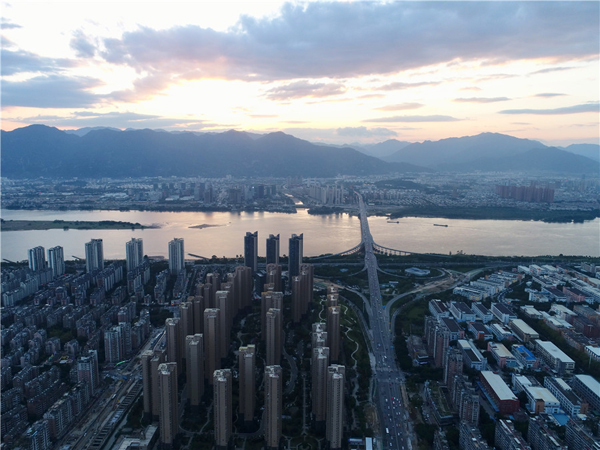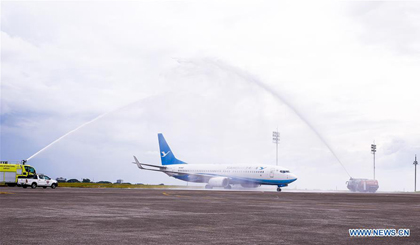Growth and prosperity lure overseas Chinese home
By Zhang Yizhi and Tai Xiao'an| China Daily| Updated: Nov 22, 2019

High-rises line the banks of the Wulong River in Fuzhou, Fujian province. The city is home to many Chinese who have returned from overseas. JIANG KEHONG/XINHUA
A growing number of people are returning after living abroad, drawn by the prospect of a brighter, wealthier future. Zhang Yizhi and Tai Xiao'an report for Xinhua China Features.
Lin Weichao (a pseudonym) runs a delivery station in the thriving boomtown of Gaoshan in the eastern province of Fujian.
However, 10 years ago he was an expat in Japan, attending language school in the daytime and juggling two part-time jobs at night.
The 34-year-old was born in Xianrenzhang, a small village with a sea view and strong winds all year round in Fuqing, a city in Fujian with an abundance of gray stone that can be found in almost every graveyard in Japan.
Giving up his Japanese permanent residence permit in 2011, Lin decided to return to China against the wishes of his mother, who had worked in seafood processing factories and laundries in Japan for more than 20 years.
Lin joined his parents in 2006 as a student of Japanese after graduating from Jimei University in the coastal Fujian city of Xiamen. Like many of his fellow townspeople in Japan, he toiled in factories and restaurants after school, which only allowed him two hours sleep per night.
He said anxiety drove him to come home. "I only saw two high-rises built during my stay in Tokyo, but every time I went home I saw changes everywhere," he said.
"I wanted to return because I feared being left behind someday."
Unlike Lin's legal entry into Japan, some early adventurers from his hometown chose to be smuggled into the country, hiding in containers along with the gray stones. People left because their villages offered scarce arable land, but the population continued to rise in the 1980s.
New trend
Fuzhou, Fujian's provincial capital, which administers coastal Fuqing, Changle and Lianjiang, has a long seafaring tradition. Over the centuries, Fujian merchants sailed around the world carrying cargos of tea and porcelain, while impoverished fishermen braved perilous currents in rickety junks to settle in Southeast Asia and beyond.
Zheng Bin, 61, was born in Guantou, a township in Lianjiang. He gained legal resident status in the United States in the 1980s.
In 2002, he tapped into the trading business by importing small commodities from Yiwu, a commercial hub in Zhejiang province.
He was one of many villagers from Fuzhou's coastal areas who succeeded in making a better life overseas. As soon as the expats had saved enough money, they would build ostentatious houses in their hometown, some equipped with elevators.
Their stories would encourage more villagers to brave dangerous journeys.
Zheng said the exodus lasted until the early 2000s. The tide began to turn when their businesses in the US experienced hardships amid the 2008 financial crisis, while on the other side of the ocean, China offered better business prospects and world-class living standards.
When Zheng left China in 1988, the per capita annual GDP in Fujian was 1,349 yuan ($361 at the time). Last year, the figure was 91,200 yuan ($13,000), the National Bureau of Statistics said.
"I had a good life in America, but I decided to return when I came across more skyscrapers, well-kept trees and vegetation, and smartly dressed people every time I visited my hometown," said Zheng, who runs a hotel in Lianjiang.
Entrepreneurs
According to Lin Zuxun, who is in charge of the Association of Returned Overseas Chinese in Guantou, more than 300 people have returned to the town from the US, and they have no intention of leaving again.
Fuzhou government statistics show that by the end of September, more than 16,000 returnees had been granted hukou, or permanent residence, in the city since September 2013.
Lu Hong gave up his US green card 10 years ago, after spending two decades running a restaurant in New York. The 47-year-old returned to his home in Fuqi village, Changle, and became head of the village, dedicating himself to the renovation of roads and halls.
Lu Minlong, Lu Hong's cousin and childhood friend, has invested in real estate development since he returned from the US in the late 1990s.
"I came back because I saw opportunities in China," the 52-year-old said. "Now my business has expanded across the country."
The younger generation living overseas sees opportunities back home and in emerging markets.
With the money he earned in Japan, Lin opened an online store and then acquired a regional franchise from a delivery company in his hometown. Later, he and his business partners bought a quarry in Myanmar.
"As long as it is open to foreign investment, we would like to give it a shot," he said, adding that instead of seeking their fortunes in developed countries, people in Fuzhou's coastal areas now prefer to invest in Africa or South America, where there are more business opportunities.
According to the Fujian Bureau of Statistics, outbound investment from the province was $2.84 billion last year, of which $1.21 billion was invested in countries and regions that are participating in the Belt and Road Initiative.
Wang Cheng, Yan Hongxin and Chen Wang contributed to the story.



 play
play